屈原简介英文版
介绍历史屈原英文作文
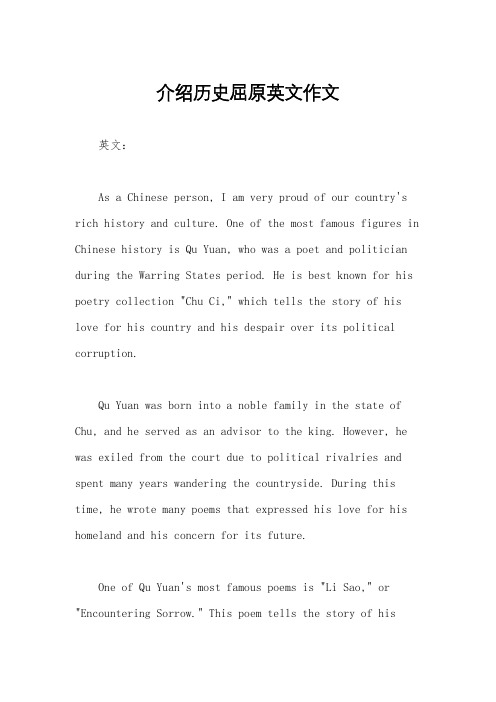
介绍历史屈原英文作文英文:As a Chinese person, I am very proud of our country's rich history and culture. One of the most famous figures in Chinese history is Qu Yuan, who was a poet and politician during the Warring States period. He is best known for his poetry collection "Chu Ci," which tells the story of his love for his country and his despair over its political corruption.Qu Yuan was born into a noble family in the state of Chu, and he served as an advisor to the king. However, he was exiled from the court due to political rivalries and spent many years wandering the countryside. During this time, he wrote many poems that expressed his love for his homeland and his concern for its future.One of Qu Yuan's most famous poems is "Li Sao," or "Encountering Sorrow." This poem tells the story of hisjourney to the underworld, where he meets the gods and reflects on his life. The poem is a powerful expression of Qu Yuan's emotions and his love for his country.Unfortunately, Qu Yuan's love for his country was not enough to save it from political turmoil. The state of Chu was eventually conquered by the state of Qin, and Qu Yuan drowned himself in the Miluo River in despair. His death is commemorated every year during the Dragon Boat Festival, when people race dragon boats and eat zongzi (sticky rice dumplings) in his honor.中文:作为一个中国人,我非常自豪我们国家丰富的历史和文化。
屈原 Qū Yuán (circa 340-278 BC)—中国历史人物英文介绍
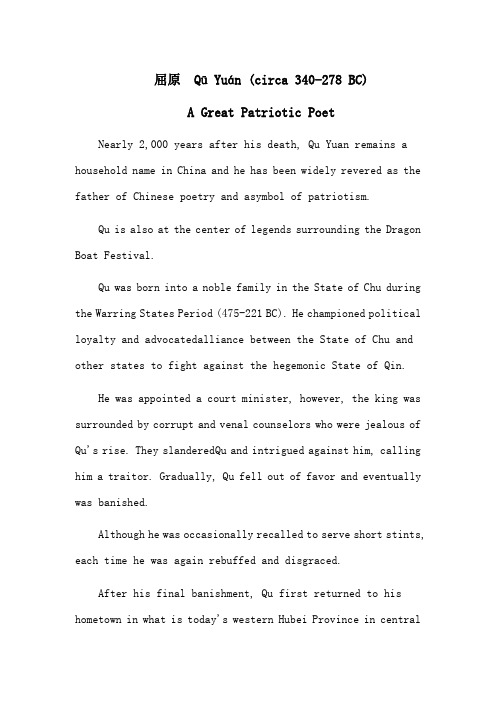
屈原Qū Yuán (circa 340-278 BC)A Great Patriotic PoetNearly 2,000 years after his death, Qu Yuan remains a household name in China and he has been widely revered as the father of Chinese poetry and asymbol of patriotism.Qu is also at the center of legends surrounding the Dragon Boat Festival.Qu was born into a noble family in the State of Chu during the Warring States Period (475-221 BC). He championed political loyalty and advocatedalliance between the State of Chu and other states to fight against the hegemonic State of Qin.He was appointed a court minister, however, the king was surrounded by corrupt and venal counselors who were jealous of Qu's rise. They slanderedQu and intrigued against him, calling him a traitor. Gradually, Qu fell out of favor and eventually was banished.Although he was occasionally recalled to serve short stints, each time he was again rebuffed and disgraced.After his final banishment, Qu first returned to his hometown in what is today's western Hubei Province in centralChina. In exile, he traveled aroundthe countryside and wrote verses to express his deep love of his home state and his concerns about its future.He created a new style of verse called saoand he wrote lines of varying lengths, unlike the classic four-character verses. For instance, Li Sao ("TheLament"), one of Qu's most remarkable works, contains 372 lines and around 2,400 characters.The long lyrical poem reflects the poet's disillusionment and agony. But in making use of a wide range of metaphors derived from the local culture, thepoem also expresses Qu's unrequited love for his country and his sadness for its inevitable decline.One day, while walking along a river, Qu met a fisherman, who asked him: "Aren't you Master of the Three Gates (a title Qu once held)? Why are younow in such a plight?"Qu answered solemnly: "All the crowd is dirty, but I alone am clean. All the crowd is drunk, but I alone am sober. That's why I have been banished."The fisherman said: "Why don't you swim with the tide, so you don't have to suffer by yourself?"Qu said: "People say that after you wash your hair you should brush your hat; and after you take a bath, you should dust your coat. I'd rather jump intothe river and bury myself in the belly of the fish, instead of sullying my clean body inthe filthy mud."In 278 BC, when Qu learned that the capital was captured by the invading Qin forces, he grabbed a heavy rock and threw himself into the Miluo River.When villagers learned the news, they rushed to the site in small boats in an unsuccessful attempt to save the poet. So they threw bamboo tubes filledwith rice into the river to distract fish and other creatures from the body of the poet. It was the fifth day of the fifth month of that lunar year.Since then, every year on that day, Chinese people participate in dragon boat races and eat zongzi, now a traditional food made of rice wrapped inreed leaves, to commemorate the great patriotic poet.Starting in 2008, that day on the Chinese lunar calendar, now known as the Dragon Boat Festival, has been designated as a state holiday.。
屈原介绍英文版五十字作文
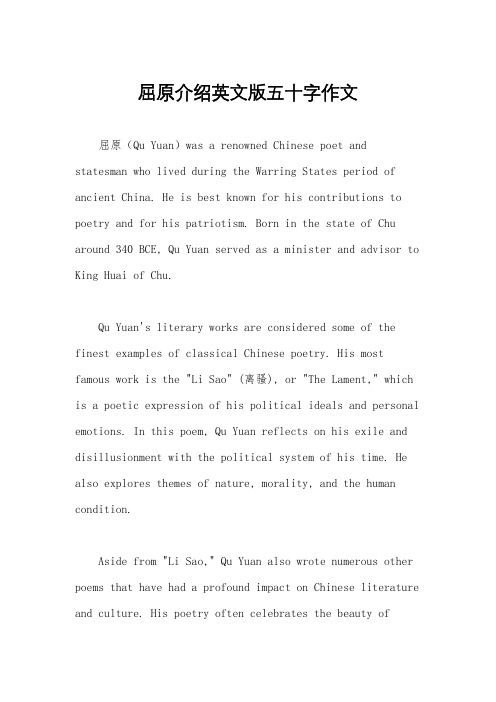
屈原介绍英文版五十字作文屈原(Qu Yuan)was a renowned Chinese poet and statesman who lived during the Warring States period of ancient China. He is best known for his contributions to poetry and for his patriotism. Born in the state of Chu around 340 BCE, Qu Yuan served as a minister and advisor to King Huai of Chu.Qu Yuan's literary works are considered some of the finest examples of classical Chinese poetry. His most famous work is the "Li Sao" (离骚), or "The Lament," which is a poetic expression of his political ideals and personal emotions. In this poem, Qu Yuan reflects on his exile and disillusionment with the political system of his time. He also explores themes of nature, morality, and the human condition.Aside from "Li Sao," Qu Yuan also wrote numerous other poems that have had a profound impact on Chinese literature and culture. His poetry often celebrates the beauty ofnature and expresses deep empathy for the common people. Qu Yuan's poetic style is characterized by its lyrical language, vivid imagery, and profound philosophical insights.In addition to his literary achievements, Qu Yuan is also remembered for his unwavering patriotism. When the state of Qin threatened to invade Chu, Qu Yuan urged the king to resist aggression and uphold the sovereignty of their state. However, his advice was ignored, and Chu eventually fell to Qin forces in 278 BCE. Devastated by the fall of his homeland, Qu Yuan drowned himself in the Miluo River as an act of protest and despair.Qu Yuan's tragic death has since been commemorated annually during the Dragon Boat Festival, which takes place on the fifth day of the fifth lunar month. During this festival, people participate in dragon boat races and eat traditional foods like zongzi (粽子) in honor of Qu Yuan's memory.In conclusion, Qu Yuan was a visionary poet and patriotwhose literary legacy continues to inspire generations of Chinese people. His profound insights into the human condition and his unwavering commitment to justice and righteousness have ensured his enduring relevance in Chinese culture. Through his poetry and sacrifice, Qu Yuan remains a symbol of integrity, resilience, and the enduring power of the human spirit.。
屈原介绍英语带翻译
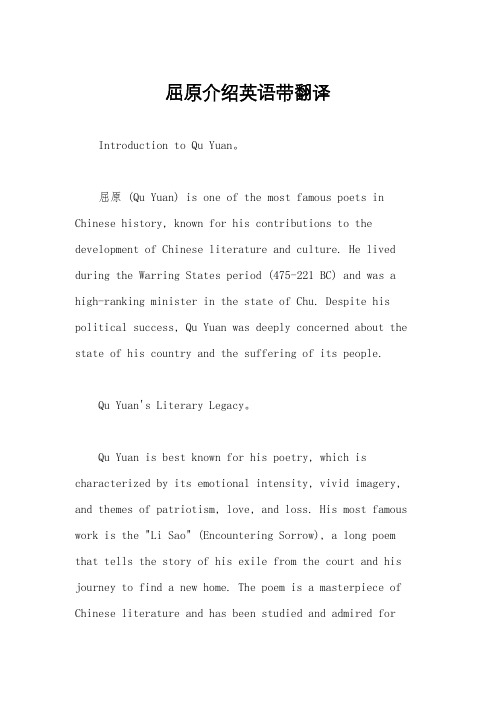
屈原介绍英语带翻译Introduction to Qu Yuan。
屈原 (Qu Yuan) is one of the most famous poets in Chinese history, known for his contributions to the development of Chinese literature and culture. He lived during the Warring States period (475-221 BC) and was a high-ranking minister in the state of Chu. Despite his political success, Qu Yuan was deeply concerned about the state of his country and the suffering of its people.Qu Yuan's Literary Legacy。
Qu Yuan is best known for his poetry, which is characterized by its emotional intensity, vivid imagery, and themes of patriotism, love, and loss. His most famous work is the "Li Sao" (Encountering Sorrow), a long poem that tells the story of his exile from the court and his journey to find a new home. The poem is a masterpiece of Chinese literature and has been studied and admired forcenturies.Qu Yuan's Influence on Chinese Culture。
英语作文介绍屈原5句
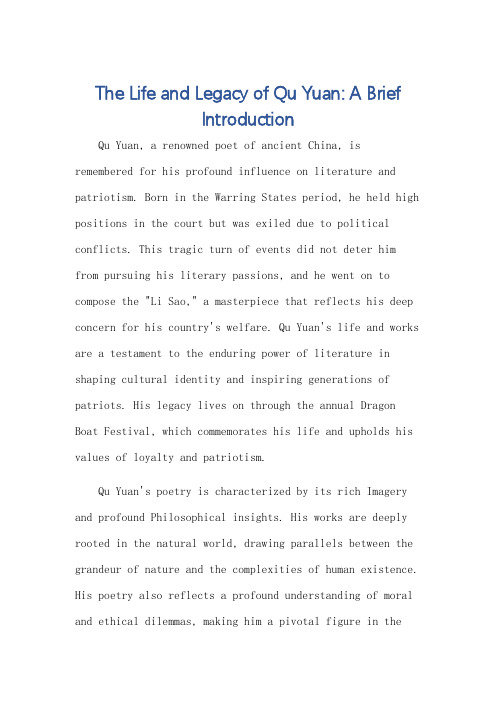
The Life and Legacy of Qu Yuan: A BriefIntroductionQu Yuan, a renowned poet of ancient China, is remembered for his profound influence on literature and patriotism. Born in the Warring States period, he held high positions in the court but was exiled due to political conflicts. This tragic turn of events did not deter him from pursuing his literary passions, and he went on to compose the "Li Sao," a masterpiece that reflects his deep concern for his country's welfare. Qu Yuan's life and works are a testament to the enduring power of literature in shaping cultural identity and inspiring generations of patriots. His legacy lives on through the annual Dragon Boat Festival, which commemorates his life and upholds his values of loyalty and patriotism.Qu Yuan's poetry is characterized by its rich Imagery and profound Philosophical insights. His works are deeply rooted in the natural world, drawing parallels between the grandeur of nature and the complexities of human existence. His poetry also reflects a profound understanding of moral and ethical dilemmas, making him a pivotal figure in thedevelopment of Chinese literary traditions. His commitment to honesty and righteousness, despite personal setbacks, has inspired countless individuals to uphold these valuesin their own lives.The Dragon Boat Festival, also known as the Duanwu Festival, is a testament to the deep respect and reverence felt for Qu Yuan. This festival, which falls on the fifth day of the fifth lunar month, involves various activities such as dragon boat races, eating zongzi (rice dumplings), and hanging herbs to ward off evil spirits. Thesetraditions are not just a celebration of Qu Yuan's life but also a reminder of his values of patriotism and loyalty. By participating in these activities, people are encouraged to emulate Qu Yuan's spirit of patriotism and self-sacrifice for the welfare of the country.The influence of Qu Yuan's poetry extends beyond the borders of China, with his works translated into various languages and studied worldwide. His legacy serves as a bridge between different cultures, allowing people from all over the world to appreciate the richness and depth of Chinese literary traditions. His life and works continue toinspire countless individuals,提醒人们关注社会正义、坚守道德信念,并在追求个人理想的过程中不忘国家和民族的福祉。
英文作文介绍屈原
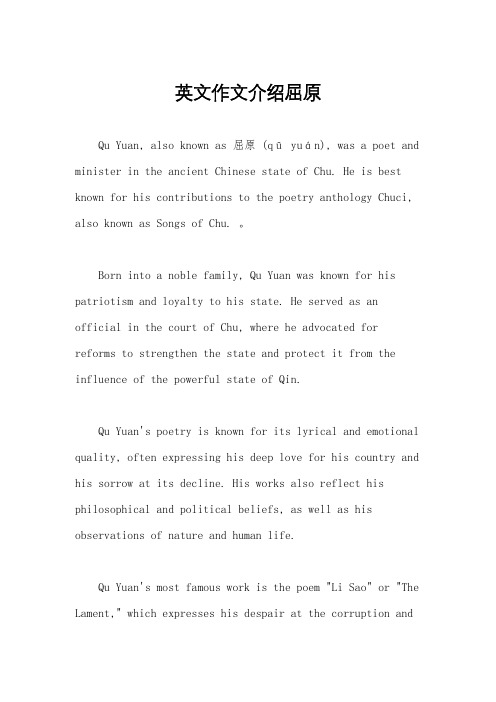
英文作文介绍屈原Qu Yuan, also known as 屈原(qū yuán), was a poet and minister in the ancient Chinese state of Chu. He is best known for his contributions to the poetry anthology Chuci, also known as Songs of Chu. 。
Born into a noble family, Qu Yuan was known for his patriotism and loyalty to his state. He served as anofficial in the court of Chu, where he advocated for reforms to strengthen the state and protect it from the influence of the powerful state of Qin.Qu Yuan's poetry is known for its lyrical and emotional quality, often expressing his deep love for his country and his sorrow at its decline. His works also reflect his philosophical and political beliefs, as well as his observations of nature and human life.Qu Yuan's most famous work is the poem "Li Sao" or "The Lament," which expresses his despair at the corruption andbetrayal he witnessed in the court of Chu. The poem is a powerful expression of his personal anguish and his lovefor his homeland.In addition to his poetry, Qu Yuan is also rememberedfor his tragic end. After being exiled by the king of Chu, he drowned himself in the Miluo River as a final act of protest against the corruption and injustice he saw in his state. His death is commemorated during the Dragon Boat Festival, when people participate in dragon boat races and eat zongzi, a traditional food associated with the festival.Qu Yuan's legacy continues to inspire people in China and around the world. His poetry and his sacrifice are seen as a symbol of patriotism, integrity, and the enduringpower of the human spirit.。
介绍屈原的相关英语文章
介绍屈原的相关英语文章English:Qu Yuan, often regarded as one of China's greatest poets, lived during the Warring States period of ancient China. Born in circa 340 BCE, he was a prominent statesman and poet in the Chu kingdom. His poetry, especially his masterpiece "Li Sao" (The Lament), reflects his patriotism, idealism, and disillusionment with the political corruption of his time. Despite his loyalty to the Chu ruler, Qu Yuan was exiled due to court intrigue. During his exile, he wrote some of his most renowned works, expressing his deep love for his homeland and his sorrow at its plight. Legend has it that when he learned of the fall of his beloved kingdom to the Qin state, he drowned himself in the Miluo River on the fifth day of the fifth lunar month, which led to the tradition of Dragon Boat Festival. Qu Yuan's poetry has had a profound influence on Chinese literature and culture, inspiring generations of poets and scholars to reflect on themes of patriotism, justice, and the human condition.中文翻译:屈原,常被认为是中国最伟大的诗人之一,生活在中国古代战国时期。
关于屈原 英文介绍作文
关于屈原英文介绍作文英文:As a Chinese person, I am very familiar with the story of Qu Yuan, a great poet and politician in ancient China. Qu Yuan lived during the Warring States period and was a loyal minister of the state of Chu. However, he was exiled by the king due to political intrigue and spent his remaining years writing poetry and advocating for the unity of China.One of Qu Yuan's most famous works is the "Li Sao" or "Encountering Sorrow" poem, which tells the story of his exile and his longing for his homeland. This poem is considered a masterpiece of Chinese literature and has been studied and admired for centuries.Qu Yuan is also known for his tragic end. When the state of Chu was defeated by the state of Qin, Qu Yuan drowned himself in the Miluo River as a form of protestagainst the corruption and injustice of the times. This act of sacrifice and devotion has made Qu Yuan a symbol of patriotism and heroism in Chinese culture.中文:作为一个中国人,我非常熟悉屈原的故事,他是中国古代的一位伟大的诗人和政治家。
介绍屈原英语作文100词左右
介绍屈原英语作文100词左右English: Qu Yuan, also known as Qu Yuan, was a renowned Chinese poet and statesman during the Warring States period. He is best known for his poems which have had a lasting impact on Chinese literature. Qu Yuan was born in a noble family in the state of Chu and served as a minister in the court. However, he was exiled due to political intrigues and spent his exile writing poetry. His most famous work is the "Li Sao" or "The Lament", which reflects his patriotism and lament for the state of Chu. Qu Yuan is also credited with being one of the originators of the Dragon Boat Festival, as his devoted followers rode boats to search for his body after he drowned himself in the Miluo River. Qu Yuan's influence as a poet and patriot is still celebrated in China today, with numerous statues, festivals, and memorials dedicated to his memory.Translated content: 屈原,又称屈原,是中国战国时期著名的诗人和政治家。
屈原英文介绍作文开头
屈原英文介绍作文开头英文:As a famous poet and politician in ancient China, Qu Yuan is widely known for his literary works and patriotic spirit. Born in the state of Chu during the Warring States period, he served as a minister in the royal court and was deeply concerned about the fate of his country. However, he was eventually exiled and committed suicide by drowning himself in the Miluo River. His tragic death has been commemorated by the annual Dragon Boat Festival, which features dragon boat races and zongzi, a traditional food made of glutinous rice wrapped in leaves. Qu Yuan's legacy has also inspired many artists, writers, and scholars to explore the themes of love, loyalty, and sacrifice in their works.中文:屈原是中国古代著名的诗人和政治家,以其文学作品和爱国精神而广为人知。
他出生于战国时期的楚国,曾在王宫中任职大臣,深切关注国家的命运。
然而,他最终被流放,并在汨罗江投水自尽。
他的悲惨死亡被每年的端午节所纪念,其中包括龙舟竞渡和粽子等传统食品。
